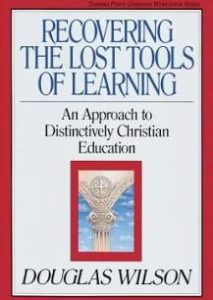
Douglas Wilson
Recommendation: 4/5
Description of author: Douglas Wilson is the pastor of Christ Church and founder of Logos School. Both are located in Moscow, Idaho.
Comments: Although I cannot fully endorse the ministry of Douglas Wilson in all points, yet I am truly a proponent of classical Christian education of which he is the foremost spokesman. Since my daughter, who is in kindergarten this year, attends a classical Christian school where this book is held in high regard, I thought it would behoove me, as a responsible parent, to read it. The book is divided into four main parts: (1) The Failure of Modern Secular Education; (2) An Approach to Distinctively Christian Education; (3) An Approach to Distinctively Classical Education; and (4) Conclusions. The title of the book is a reference to a paper read by Dorothy Sayers at Oxford University in 1947 entitlted “The Lost Tools of Learning” (reprinted in full in Appendix A). Dorothy Sayers was calling educators back to an approach to learning that was standard in the Middle Ages. The approach was one that emphasized in the early years (before university), not so much the mastering of subjects, as much as the mastering of the tools of learning. In other words, the goal was to teach children how to think and how to master subjects, not so much what to think. Education was centered around the Trivium (grammar, logic, and rhetoric). The emphasis in grammar is memorization of data. In logic, the student is taught the relation between subjects and how to reason. In rhetoric the emphasis is on communication and expression. Every subject (language, math, geography, history, science, etc.) is approached in this way. The classical approach also emphasizes the learning of Latin, starting in the 3rd grade, as a means of facilitating the learning of English vocabulary, as a foundation for learning other languages, and as a preparation for higher learning where Latin is used in the terminology. I must admit I am personally puzzled as to why schools generally do not teach Latin. The curriculum advocated by Wilson includes teaching reading through phonics, the use of primary sources, and the use of classic western literature. Wilson combines this classical approach with a Christian approach, one that teaches all subjects with a Christian worldview in mind and that takes into account the fallen nature of man and his need of redemption. He also underscores the responsibility of the parents to be fully involved in their children’s education. I am in full agreement with the approach set forth by Wilson (I must admit I am a bit envious of my daughter), but the danger, as is always the case with education in general, is an elitist attitude. We must ever be mindful that our ultimate goal in education is not to create intellectuals, but rather to cultivate godly, thinking, and discerning Christians.